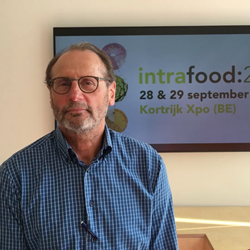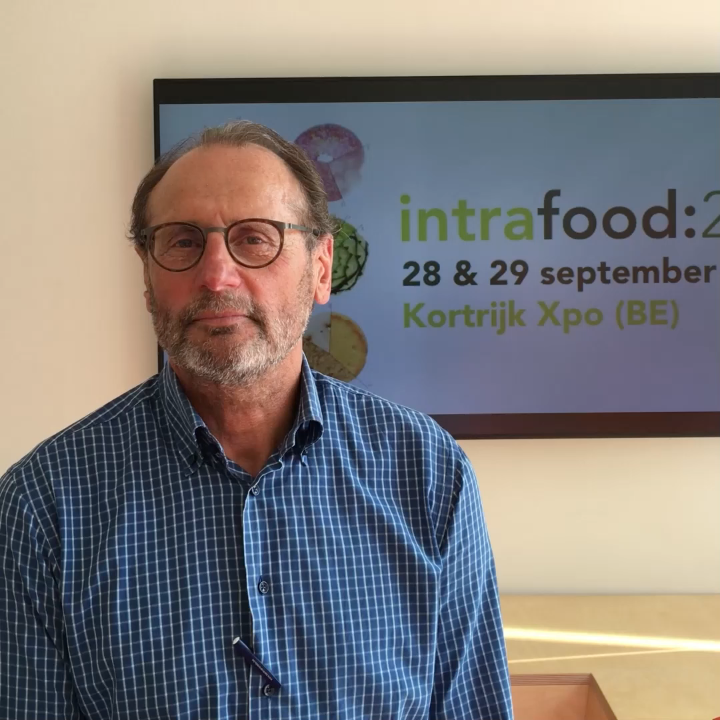


The seminar on the second day of Intrafood, on 29 September, will focus on the latest process technologies and the impact of ‘smart processing’ on product innovation and ingredients. “Ingredients are all about technology,” stresses Philippe Snick of ie-net.
The 50th anniversary of ie-net’s Voeding [Nutrition] expert group is a great opportunity to organise a seminar on process technology and nutrition on Thursday 29 September, together with Intrafood. “Ingredients are all about technology. This is often underestimated within the food industry in Belgium, unlike in the Netherlands,” says Philippe Snick, seminar chair for the food expert group of the engineering association ie-net and founder of Snick Euroingredients. “In this respect, the Netherlands is a forerunner in process technology. Wageningen University & Research and the machine manufacturers are at the centre of this.” According to Snick, this does not alter the fact that the Belgian food industry is operating at the highest level of quality and is very important in Europe. He mentions in particular the vegetable, potato, baked goods, chocolate and beer sectors.

Innovate
“If a food company wants to innovate further, process technology will become more and more important. This is especially true when companies are looking for alternative ingredients due to harvest and supply problems caused by COVID, the war in Ukraine or for the development of plant-based alternative products,” explains Snick. “This doesn’t just mean replacing ingredient A with B, even though the product specifications appear to be the same. Companies are not sufficiently aware that the functionalities in terms of texture and taste aren’t necessarily the same. Technology and processing will then become more and more important, especially for plant-based alternative products,” says Snick, speaking from experience. “Animals make the ideal product in terms of taste and texture, which is difficult to match by simply combining ingredients.”

Technologies
Innovative mild process technologies, such as low-heat low-pressure extrusion, pulsed electric fields or radio frequency waves, will be discussed in this seminar. For example, extrusion through the power heater provides the desired texture and bite for plant-based meat mimics. Another example is ultra-high pressure homogenisation in the development of low-fat margarines or low-fat dressings.
According to Snick, the relevant advantages of these technologies are that you can develop a higher-quality food product by extracting the desired functionality(ies) from native raw materials, meaning you may need to use fewer ingredients or additives, which also meets the demand for cleaner labels. “Product developers are quick to turn to alternative ingredients or additives to correct a problem with another ingredient. They often forget to make the switch to technology.”

“It is always advisable to maintain a critical perspective on your own products and adjust them to contemporary needs where necessary”, emphasises Marijke Adriaens, CEO of frozen food company Fribona. “For consumers, taste is still the main consideration. It is essential to work towards a product that is, above all, tasty and visually appealing.”...

Scientists from KU Leuven have discovered how oil penetrates snacks during and after the frying process. Recent research findings point to advanced frying techniques that reduce oil absorption, as well as innovative methods to limit oil uptake during the cooling phase. This paves the way for the development of healthier snacks without compromising...

Food companies are increasingly targeting a wider range of consumer groups. Speaking at an event organised by Fenavian, Julian Mellentin of New Nutrition Business said this strategy offers significant opportunities to respond to the diverse health needs and interests of today’s consumers. “Consumers enjoy both animal and plant-based proteins”, he...

Backed by financial partners, Start it @KBC is launching the accelerator programme Scale it Agro, aimed at scale-ups offering sustainable and innovative agricultural solutions for agriculture and horticulture businesses. Kjell Clarysse, programme director at Scale it Agro, goes into more detail.